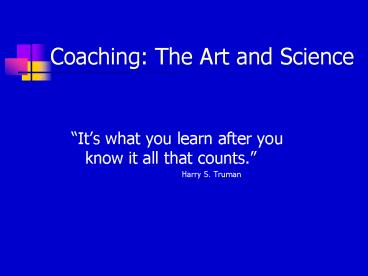Coaching: The Art and Science - PowerPoint PPT Presentation
Title:
Coaching: The Art and Science
Description:
Coaching: The Art and Science It s what you learn after you know it all that counts. Harry S. Truman Emotional Control Emotions (feelings) Provide energy ... – PowerPoint PPT presentation
Number of Views:102
Avg rating:3.0/5.0
Title: Coaching: The Art and Science
1
Coaching The Art and Science
- Its what you learn after you know it all that
counts. - Harry S. Truman
2
Emotional Control
- Emotions (feelings)
- Provide energy catalyst for the joy of
victory - Cause of despair and hopelessness the agony of
defeat
3
Ideal Emotional State (IES)
- Condition in which the athlete experiences
appropriate feelings at optimum level of
intensity and function in a way that enhances
performance - How does one get into the zone (IES)
- http//www.youtube.com/watch?va48fe_K6M80
4
Emotions (Lazarus, 2000)
- 1. Anxiety 2. Anger 3. Shame 4. Guilt 5.
Hope 6. Relief 7. Pride 8. Happiness - Cannot experience two contrasting emotions at the
same time. - Practical applications?
5
Anxiety
- Definition disturbance of mind regarding some
uncertain event - Worry, misgiving, nagging doubt, fear
- Types (pg 22)
- Somatic or physical
- Cognitive or mental
- Trait
- State
6
Relevance to Performance
- Functional anxiety
- Improves performance by facilitating appropriate
thoughts or actions - Dysfunctional anxiety
- Detracts from performance by causing
inappropriate thoughts , feelings and behaviours
7
Causes of Negative Anxiety (pg 25)
- Somatic (physical)
- Tiredness
- Organizational issues
- Chronic adrenalin rush
- Chronic tension
- Increased physiological states (i.e. heart rate)
- Cognitive (mental)
- Fear of disappointing
- Fear of failing
- Fear due to poor preparation
- Uncontrollable variables
- Officials bad calls
- Lack of support
8
Arousal and Performance (pg 26)
- Inverted U Theory
- Drive Theory
- Individualized Zones of Optimal Functioning
9
Managing Anxiety
- Heart rate
- Breathing Control (pg 30)
- http//www.youtube.com/watch?vXz-KDXWsepI
- Kinesthetic Controlled Breathing
- Audio Controlled Breathing
- Relaxation Response (pg 31)
- Mind to body control
- slow, easy, calm, relaxed
- http//www.youtube.com/watch?vP-ygq1W681Afeature
related - Body to mind
- Muscle relaxation
- http//www.youtube.com/watch?v4xNSXtkFBDkfeature
related
10
VisualizationWhat you see is what you get
11
Goal Setting
- Goals statements of what you want to accomplish
- Provide sense of purpose and direction
- Outcome Goals what you want to achieve
- Competition Goals hierarchy
- Self-Improvement goals
- Process Goals how you will go about to achieve
goals - Short and Long Term Goals monitor and success
- Payoffs of Collaborative Goal Setting (pg 41)
12
Planning for Mental Preparation
Mental Skill Time of Season
Mental Skill Beginning Middle Peak Time End
Setting Goals Identify and set goals Monitor Re-evaluate Re-evaluate Debrief Re-evaluate
Managing Focus Introduce and Develop Simulate Refine Implement Re-evaluate
Managing Negative Anxiety Introduce and Develop Simulate Refine Implement Re-evaluate
13
Mental Skills Planning Within a Practice
- Introduction
- practice plan, goals, visualization
- Warm-up
- Understand goals, movements with visualization
- Main Part
- Simulations, cue words, self talk
- Cool Down
- Relaxation techniques (progressive - body to
mind) - Conclusion
- Circle with comments































